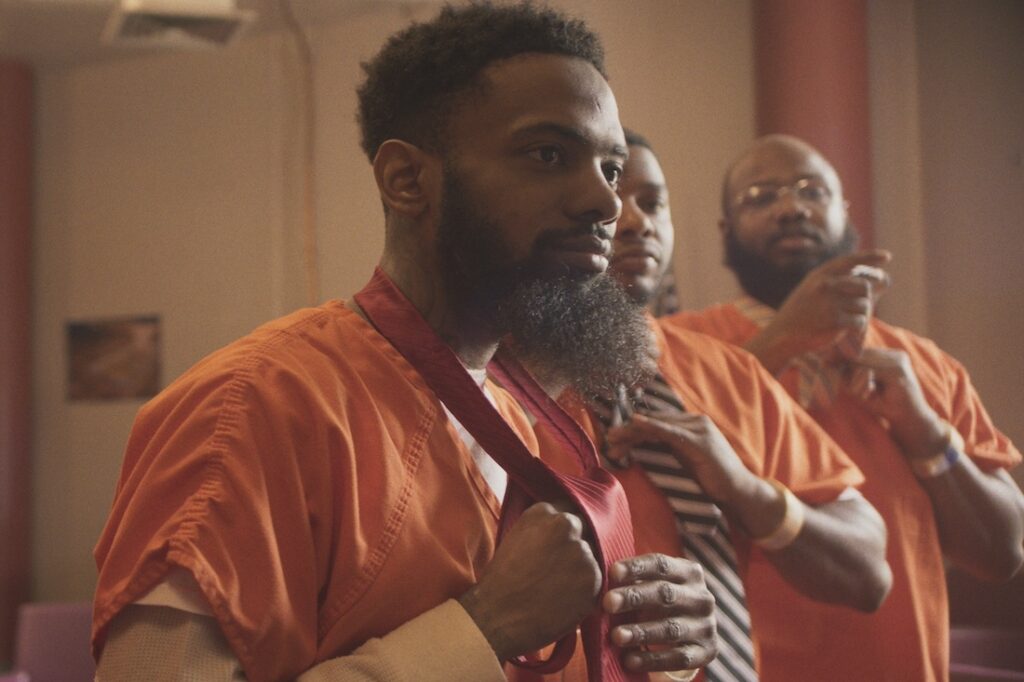Documentary Demonstrates the Strength of Father-Daughter Bonds, How They Transcend Even Iron Bars
Filmed over several years and having its premiere August 9 at the IFC Center before arriving at Netflix next week, ‘Daughters’ may well be the most emotional viewing experience of the year.

The new documentary “Daughters” centers on a group of tween and teenage girls as they attend a dance with their incarcerated fathers, and this beautiful, sensitive film may well be the most emotional viewing experience of the year.
Filmed over several years and having its premiere August 9 at the IFC Center before arriving at Netflix next week, the doc spotlights the Date With Dad program, which aims to foster strong bonds between Black fathers and their daughters. The program evolved to include prisons after one girl, feeling excluded, asked, “What if we had the dance in the jail?”
Date With Dad began as an initiative sprung from Camp Diva, a summer camp founded by Angela Patton, who is also a co-director of the documentary along with Natalie Rae. The program’s first jail event took place at a Richmond facility in 2013, and has since expanded to other cities. It is within a D.C. correctional facility in 2019 that the doc focuses its narrative.
At the start we meet adorable, precocious Aubrey, aged 5, as she discusses how many years her father, Keith, is to be in prison (seven) and how she’s the smartest in her class. Over the course of the film’s first hour, we meet other girls, too, such as 10-year-old Santana, who provides a stark contrast to Aubrey’s bubbliness. Discontented, Santana’s pronouncements come off as jaded for such a young girl.

When we see her at a laundromat with her mother and two younger siblings, we hear her say, “My dad not around, so I’m the dad,” and one can discern the almost ironic hurt in her voice. Declaring that she won’t have kids when she grows up, and may not even marry, Santana is implicitly criticizing her parents.
Footage of the imprisoned patriarchs is seamlessly integrated among the deftly drawn cinematic portraits of the young girls. Those inmates eligible for Date With Dad are required to participate in a 10-week discussion group before the special event. As the moderator brings up the importance of family bonds, the specter of absent fathers and mothers in their own lives haunt the faces of the men, making them seem as insecure as some of their children.
The crimes these men committed go unaddressed, with only hints one or two of them may be in for murder. Although unconcerned with their offenses, “Daughters” nevertheless is suffused with regret and remorse, particularly during the prisoners’ pre-event talk therapy sessions. It also examines the idea of punishment, delving into how most correctional facilities have stopped allowing in-person “touch visits,” replacing them with often costly video calls. When Ms. Patton discusses the importance of touch in a child’s development, one begins to wonder who is paying a higher price for the sins of the father.
The doc is not just sad and grim, though, owing to notes of humor that appear here and there throughout, such as dad jokes. The mood is greatly elevated as well by the consummate cinematography of Michael Fernandez, with its crystalline colors, perceptive close-ups, and poetic compositional flourishes. Once the girls and their fathers are shown getting dressed and styled for the event, set to the tune of the original “Sea of Love” by Phil Phillips & The Twilights, the documentary almost becomes a sort of teen prom picture, reinforcing the huge influence father-daughter connections have on girls’ future relationships with boys/men.
The event itself provides the film with its sustained emotional high-point, while also coming off as all too brief. After poignant reunions, the girls and their fathers sit down at event tables, take pictures with disposable cameras, enjoy some food and drink, and dance. (Due to their often fraught relationships with the incarcerated fathers, mothers are not allowed to participate.)
There are some tense exchanges, some lighthearted, and many heartwarming moments. Then, after a few hours are condensed to mere minutes on screen, the time to depart arrives, and once again the agony of separation is thrust upon both parties — a pain they all knew they would have to bear anew but still accepted, as it also allowed for great joy.
In their epilogue, the filmmakers demonstrate the immediate and long-term impact of the event. The documentary jumps to a year later and then three years later, and some bonds have grown stronger, while others have turned distant, such as Aubrey and Keith’s. The most heartbreaking of all the movie’s moments might arrive when we watch the little girl’s irrepressible spirit diminish over a couple years, whether from incipient adolescence, her father’s increased sentence, or a combination of the two.
Yet all is not lost, for we also see Santana’s father’s successful reintroduction into society and family life, and the young girl’s new, positive outlook. As we’re informed at the very end, 95 percent of fathers who participate in Date With Dad never return to jail upon release. The issue of recidivism aside, “Daughters” doesn’t make any grand political statement, yet the gripping documentary holds fast to one of the most miraculous forces in humankind: forgiveness.

